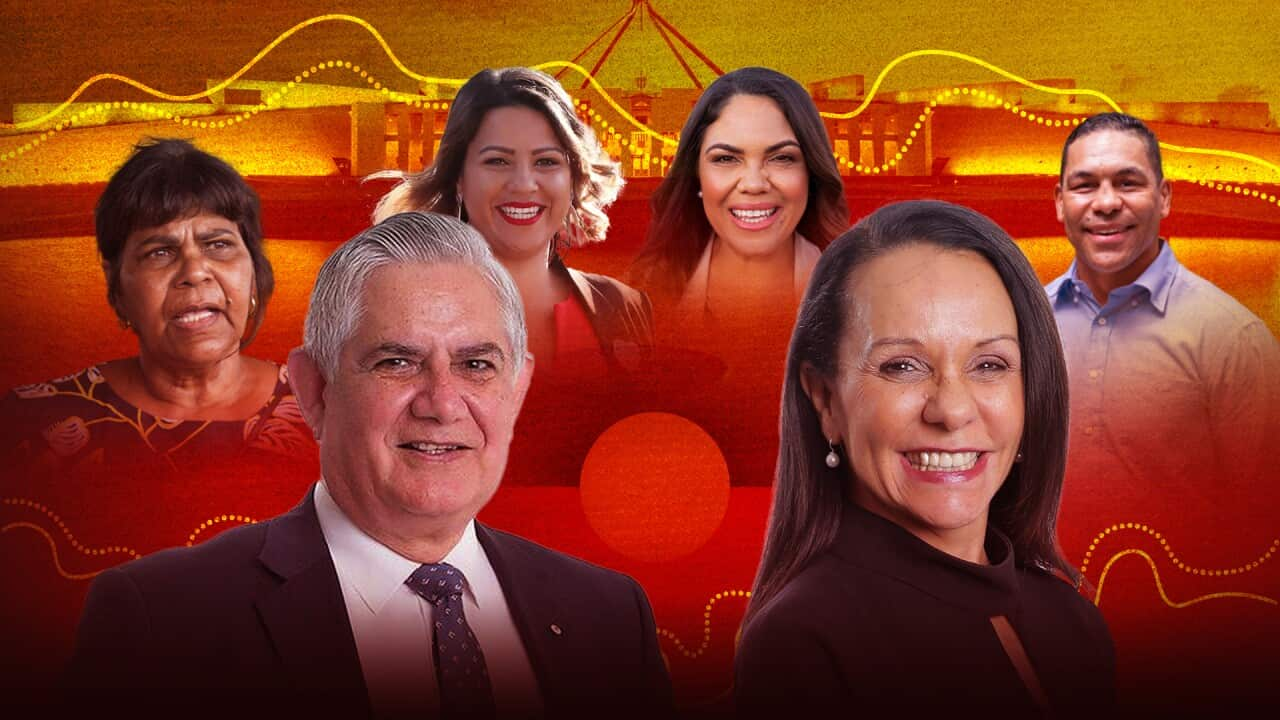In the 51 years since Neville Bonner became the first Indigenous person to take a seat in the federal parliament, the number of First Nations representatives has slowly increased.
This election has the most First Nations candidates in history, with four running for the Coalition, 11 for Labor, and a total of 17 for the Greens.
So who are the new Indigenous faces hoping for a spot in the House on the hill?
Rod Jensen - Katter’s Australian Party

Former NRL player Rod Jensen is hoping to represent the Far North Queensland seat of Leichhardt.
Mr Jensen, who played for the Canberra Raiders and North Queensland Cowboys, retired from the rough and tumble footy to turn his hand to teaching. He has mentored young people throughout Far North Queensland.
The Queenslander is running on a platform to boost economic participation for First Nations people in Leichhardt, health and aged care, as well as Indigenous adoption in his home state.
Bob Katter, the renegade MP, has held the neighboring seat of Kennedy since 1993 — first with the National Party before striking out on his own as an Independent. He founded his own party in 2011.
Jacinta Price - Country Liberal Party

Country Liberal Party's Jacinta Nampijinpa Price is vying her a term in the Senate to represent the NT (NITV)
In the 2019 federal election , Ms Price, ran against long-term Labor MP Warren Snowdon in the seat of Lingiari, securing 44.4 percent of the vote, narrowly losing out to her Labor counterpart.
She has been rubbing shoulders with prime minister Scott Morrison on the campaign trail recently, as the Coalition attempts to capitalise on Labor’s Warren Snowden retirement from politics.
Ms Price has been a councillor in Alice Springs since 2015, and is a regular contributor to Sky News and The Australian newspaper.
The candidate has not been without her controversies.
She has defended controversial Liberal candidate for Warringah Katerine Deves who has been criticised for her views on transgender people, saying she was "being silenced in the name of wokeness"..
In 2019 she was accused of posting Islamophobic content to her Facebook page, the same year she suggested the Coffs Harbour Aboriginal community was "bonkers" for requiring her to request permission to enter their land.
Marion Scrymgour - Labor

Labor candidate Marion Scrymgour is hoping to retain the seat after Warren Snowdon's retirement. Source: Supplied
Covering more than a million square kilometres it stretches from the outback to the tropics and even includes the Christmas and Cocos Islands.
Every town and remote community, except the capital Darwin and neighbouring city of Palmerston will vote in this marginal house of reps seat, and with Labor stalwart Warren Snowdon stepping down the seat is up for grabs.
Ms Scymgour was the first Indigenous woman elected to the Northern Territory parliament, serving as the deputy chief minister, before becoming the Chief Executive of the Northern Land Council.
The Tiwi woman will be up against the Country Liberal Party’s Damien Ryan in a crucial marginal seat both major parties are trying to woo.
Allison Bluck - Liberal

Mayo Liberal Candidate Allison Bluck hopes to wrestle the marginal seat from the Centre Alliance.
Ms Bluck told NITV News she is an Awabakal woman from the New South Wales Central Coast in Newcastle and is campaigning strongly on building economic and small businesses in South Australia and hopes to represent First Nations issues in Parliament.
The seat of Mayo was traditionally a Liberal stronghold before swinging to the Centre Alliance and Nick Xenophon party in 2016.
Josephine Cashman - One Nation
Josephine Cashman's website says she is a Warrimay woman from the mid-north New South Wales coast.
The former lawyer and businesswoman is running for a seat in the senate with the far-right One Nation Party, headed by polarising figure Pauline Hanson. Ms Cashman is running in the division of Lyne in New South Wales, a safe senate seat for the Nationals, arguing voters are being ignored by major political parties.
Ms Cashman is running in the division of Lyne in New South Wales, a safe senate seat for the Nationals, arguing voters are being ignored by major political parties.

Josephine Cashman is running for One Nation Party in the NSW seat of Lyne.
The New South Wales politician was also part of the coalition’s Indigenous Advisory Council from 2013 to 2017 but was sacked from her advisory role for the Indigenous Voice to Parliament after it emerged she had publicly questioned acclaimed author Bruce Pascoe's Indigenous identity.
Indigenous Aboriginal Australians Party
Paakindji and Malyangapa man Uncle Owen Whyman launched the from Wilcannia in December 2020 in the hopes of elevating First Nations issues to Canberra especially protecting waterways and land.

Owen Whyman and his family standing by the Darling River which flows through their town of Wilcannia. Source: SBS
Political heavyweights vie for another term
Meanwhile, Indigenous veteran Ken Wyatt is hoping to hold onto his crucial seat in Western Australia as he has for 12 years.
The Noongar man has been vocal on his drive for boosting economic participation for First Nations Australians, and the (so-far failed) bid to legislate an Indigenous Voice to Parliament
This election may prove tighter, with the Coalition needing to hang on to every seat as Australians head to the polls with Hasluck being held by a margin of 5.4 percent.
Wiradjuri woman Linda Burney is up for re-election in the western Sydney electorate of Barton. She has held on to the seat since 2016, when she was elected as the First Aboriginal woman to sit in the House of Representatives.
She holds the safe Labor seat with a margin of 9.4 percent.
In the Northern Territory, Malarndirri McCarthy, the prominent Yanyuwa senator for the Territory since 2016, was re-elected in the last 2019 election and is hoping for a third term in the senate chamber










